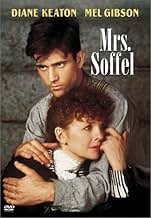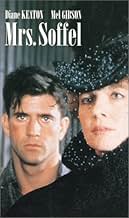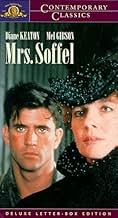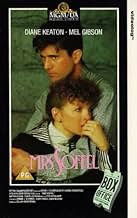CALIFICACIÓN DE IMDb
6.1/10
3.8 k
TU CALIFICACIÓN
Diane Keaton interpreta a la esposa de un alcaide de prisión que se enamora de un condenado a muerte (Mel Gibson). Creyendo que es inocente, le ayuda a él y a su hermano convicto a escapar.Diane Keaton interpreta a la esposa de un alcaide de prisión que se enamora de un condenado a muerte (Mel Gibson). Creyendo que es inocente, le ayuda a él y a su hermano convicto a escapar.Diane Keaton interpreta a la esposa de un alcaide de prisión que se enamora de un condenado a muerte (Mel Gibson). Creyendo que es inocente, le ayuda a él y a su hermano convicto a escapar.
- Dirección
- Guionista
- Elenco
- Premios
- 3 nominaciones en total
Jennifer Dundas
- Margaret Soffel
- (as Jennie Dundas)
- Dirección
- Guionista
- Todo el elenco y el equipo
- Producción, taquilla y más en IMDbPro
Opiniones destacadas
It's 1901 Pittsburgh. Kate Soffel (Diane Keaton) is the wife of prison warden Peter Soffel (Edward Herrmann). Ed Biddle (Mel Gibson) and Jack Biddle (Matthew Modine) are brothers on death row for murder although they claim to be innocent. Kate befriends Ed. It grows into a romance and she helps them escape.
This is based on a true story. It doesn't always make it compelling. I can do with a lot less of the courting in the first half. It is terribly boring and terribly long. It takes an hour before they escape. The escape and the fugitive stages have a bit more tension which this movie sorely needs. As for the romance, it's hard to know Ed's true feelings until they become fugitives on the run. Keaton and Gibson do try to generate some heat at that point. It's a 50-50 proposition. It feels more like a romance novel. The most compelling scenes happen in the last five minutes. It is a very long slough to get there.
This is based on a true story. It doesn't always make it compelling. I can do with a lot less of the courting in the first half. It is terribly boring and terribly long. It takes an hour before they escape. The escape and the fugitive stages have a bit more tension which this movie sorely needs. As for the romance, it's hard to know Ed's true feelings until they become fugitives on the run. Keaton and Gibson do try to generate some heat at that point. It's a 50-50 proposition. It feels more like a romance novel. The most compelling scenes happen in the last five minutes. It is a very long slough to get there.
(1984) Mrs. Soffel
DRAMA/ SOCIAL COMMENTARY
Starring Mel Gibson as prisoner, Ed Biddle and Diane Keaton as Kate Soffel that was supposedly based on fact. That happened in 1901 centering on those two characters unusual love affair. 'The Biddle Brothers' of Ed (Mel Gibson) and his brother, Jack (Mathew Modine) are sentenced to death because of another former criminal's testimony, which this guy claims he saw the brothers shoot and kill a defenseless store clerk. Except that these claims are made by a convict who already has a criminal record. And since out of the many robberies the Biddle Brothers had done together, their had never been a recorded incident where someone had been killed as a result of those robberies, so it's more probable than not that it had never happened. Anyways, Mrs. Soffel is married to the warden of this particular prison where all she does is hand out bibles and blankets to all the inmates. At first, she doesn't believe Ed (Gibson) when he tells her that him and his brother are innocent in regarding a clerk's death, but as a result of putting one her daughters into bed, her daughter informs her as a result of saving newspaper clippings that it's more probable than impossible that 'the brothers' may be innocent. Ed then strike up an emotional attraction with Mrs. Soffel since she's not getting any from her impotent husband anymore, which her marriage seems to be lifeless. As viewers witness they sleep in separate rooms and act like husband and wife in principal only. And it was during that time, she of course does her best to prevent this death penalty to occur. Although, I liked both Mel Gibson and Diane Keaton's performances, the story structure is somewhat dull and predictable. For it was obvious the film is clearly arguing against the death penalty, solely for this reason is that the accused might be innocent. And this message was mentioned like in the first half hour before it drags and prolongs the movie by showcasing the two characters of Keaton and Gibson becoming intimate with one another, something one can get from a Harlequin novel. And that is boring which forced me to use the fast forward button on many scenes while playing.
Starring Mel Gibson as prisoner, Ed Biddle and Diane Keaton as Kate Soffel that was supposedly based on fact. That happened in 1901 centering on those two characters unusual love affair. 'The Biddle Brothers' of Ed (Mel Gibson) and his brother, Jack (Mathew Modine) are sentenced to death because of another former criminal's testimony, which this guy claims he saw the brothers shoot and kill a defenseless store clerk. Except that these claims are made by a convict who already has a criminal record. And since out of the many robberies the Biddle Brothers had done together, their had never been a recorded incident where someone had been killed as a result of those robberies, so it's more probable than not that it had never happened. Anyways, Mrs. Soffel is married to the warden of this particular prison where all she does is hand out bibles and blankets to all the inmates. At first, she doesn't believe Ed (Gibson) when he tells her that him and his brother are innocent in regarding a clerk's death, but as a result of putting one her daughters into bed, her daughter informs her as a result of saving newspaper clippings that it's more probable than impossible that 'the brothers' may be innocent. Ed then strike up an emotional attraction with Mrs. Soffel since she's not getting any from her impotent husband anymore, which her marriage seems to be lifeless. As viewers witness they sleep in separate rooms and act like husband and wife in principal only. And it was during that time, she of course does her best to prevent this death penalty to occur. Although, I liked both Mel Gibson and Diane Keaton's performances, the story structure is somewhat dull and predictable. For it was obvious the film is clearly arguing against the death penalty, solely for this reason is that the accused might be innocent. And this message was mentioned like in the first half hour before it drags and prolongs the movie by showcasing the two characters of Keaton and Gibson becoming intimate with one another, something one can get from a Harlequin novel. And that is boring which forced me to use the fast forward button on many scenes while playing.
This one was a nice surprise, I hadn't seen it when it first came out, so I rented it and enjoyed it thoroughly. Diane Keaton and Mel Gibson carry the day in this true tale of a wardens wife who falls for a prisoner. Matthew Modine does a fine job as Mel Gibsons brother, and the entire cast is fine. It's beautifully shot in Pittsburgh, and there is a languid quality about it that I found alluring. Well done all around.
"Mrs. Soffel" is a wonderful movie I have seen many times, but the last viewing was so many years ago I'm watching it right now on TCM.
I'm a sucker for movies whose main characters suddenly, inexplicably make a decision which goes against everything they seem to embody, or at least that which the viewer has come to know about them. That Kate Soffel's story is a true one makes it all the more intriguing.
In early 20th-century America, the lot of a wife, even that of a well-to-do-man and mother to lovely children, was a lonely, empty, barren existence. In a wealthy household with servants, there was very little meaningful work for the mistress of the house to do every day.
Even the layers upon layers of clothes Victorian women wore served no practical purpose except to restrict movement and render their wearers merely decorative. Express your opinions and you got packed off to visit relatives in hopes that maybe the change of scenery would "do you good." There were millions of avenues for creative expression and enterprise that were simply cut off for women.
Good minds went to waste. Souls shriveled and died.
Kate Soffel (Diane Keaton) was the wife of a prison warden in Pittsburgh at the turn of the last century. She served as something of a missionary to the prisoners, giving them Bibles, holding prayer readings with them and hoping to guide them towards remorse and redemption. She never expects to fall in love with one of the inmates. But fall she does, for the charming Ed Biddle (Mel Gibson), who along with his brother Jack, (Matthew Modine) are in jail on murder charges.
Kate is suffocating; the Biddles are desperate. Prone to fits of melancholy and depression, plagued with fears that she is not a good mother and that she has failed her husband -- whom she has come to learn she really doesn't know very well -- Kate, like so many women of her era, is desperate for something to end the tedium, the frustration, the despair. She is a perfect candidate for the dangerous voyage she helps plan and sets out on with the Biddle brothers.
"Mrs. Soffel" raises many ethical and moral issues, among them the divergent path Kate takes from her religious teachings, and the Biddle brothers' guilt or innocence. It can be appreciated equally on one or more levels, but it remains a remarkably restrained depiction of emotions and passion that are anything but.
I'm a sucker for movies whose main characters suddenly, inexplicably make a decision which goes against everything they seem to embody, or at least that which the viewer has come to know about them. That Kate Soffel's story is a true one makes it all the more intriguing.
In early 20th-century America, the lot of a wife, even that of a well-to-do-man and mother to lovely children, was a lonely, empty, barren existence. In a wealthy household with servants, there was very little meaningful work for the mistress of the house to do every day.
Even the layers upon layers of clothes Victorian women wore served no practical purpose except to restrict movement and render their wearers merely decorative. Express your opinions and you got packed off to visit relatives in hopes that maybe the change of scenery would "do you good." There were millions of avenues for creative expression and enterprise that were simply cut off for women.
Good minds went to waste. Souls shriveled and died.
Kate Soffel (Diane Keaton) was the wife of a prison warden in Pittsburgh at the turn of the last century. She served as something of a missionary to the prisoners, giving them Bibles, holding prayer readings with them and hoping to guide them towards remorse and redemption. She never expects to fall in love with one of the inmates. But fall she does, for the charming Ed Biddle (Mel Gibson), who along with his brother Jack, (Matthew Modine) are in jail on murder charges.
Kate is suffocating; the Biddles are desperate. Prone to fits of melancholy and depression, plagued with fears that she is not a good mother and that she has failed her husband -- whom she has come to learn she really doesn't know very well -- Kate, like so many women of her era, is desperate for something to end the tedium, the frustration, the despair. She is a perfect candidate for the dangerous voyage she helps plan and sets out on with the Biddle brothers.
"Mrs. Soffel" raises many ethical and moral issues, among them the divergent path Kate takes from her religious teachings, and the Biddle brothers' guilt or innocence. It can be appreciated equally on one or more levels, but it remains a remarkably restrained depiction of emotions and passion that are anything but.
Australian director Gillian Armstrong makes great films with strong women characters--her earlier Australian film "My brilliant career" being a perfect example. I watched "Mrs. Soffel" because of my admiration for Armstrong and found that "Mrs. Soffel" could not hold a candle to "My brilliant career" even though American actress Diane Keaton was admirable compared to the Australian actresses in the latter.
Armstrong had the talented Australian cinematographer Russel Boyd (who was responsible for the seminal works of Peter Weir and Bruce Beresford) once again to work with. While Armstrong and Boyd used justifiably darkened interior shots, I had problems seeing anything for long periods and had to rely on the soundtrack!
Armstrong loves to develop the female characters but leaves the male characters totally undeveloped (Mr Soffel and Jack Biddle). This is one reason I prefer the works of Weir and Beresford over Armstrong--even though her latent talent cannot be ignored. It is amazing to see Soffel's daughter getting equal or more prominence in the script than Mr Soffel towards the end.
Mel Gibson has made a name for himself by directing "Braveheart," but I give more credence to his acting phase in Australia ("Tim", "Mad Max", etc.). I am convinced that he is a director's actor--doing well with good directors. In "Mrs Soffel" Armstrong has evidently invested time with Diane Keaton, who carries the film. Gibson only lends support to her thanks more to the script than his acting capabilities.
Most of the fine tribe of Australian filmmakers of the Seventies have drifted to the US to become richer and gain international recognition--but their work in Australia in the Seventies remains unsurpassed.
Armstrong had the talented Australian cinematographer Russel Boyd (who was responsible for the seminal works of Peter Weir and Bruce Beresford) once again to work with. While Armstrong and Boyd used justifiably darkened interior shots, I had problems seeing anything for long periods and had to rely on the soundtrack!
Armstrong loves to develop the female characters but leaves the male characters totally undeveloped (Mr Soffel and Jack Biddle). This is one reason I prefer the works of Weir and Beresford over Armstrong--even though her latent talent cannot be ignored. It is amazing to see Soffel's daughter getting equal or more prominence in the script than Mr Soffel towards the end.
Mel Gibson has made a name for himself by directing "Braveheart," but I give more credence to his acting phase in Australia ("Tim", "Mad Max", etc.). I am convinced that he is a director's actor--doing well with good directors. In "Mrs Soffel" Armstrong has evidently invested time with Diane Keaton, who carries the film. Gibson only lends support to her thanks more to the script than his acting capabilities.
Most of the fine tribe of Australian filmmakers of the Seventies have drifted to the US to become richer and gain international recognition--but their work in Australia in the Seventies remains unsurpassed.
¿Sabías que…?
- TriviaThe jail used in the movie is the actual Allegheny County Jail that figures in the story. Designed by noted architect Henry Hobson Richardson, built between 1884-1888, it served as a jail until 1995 and is now used by the juvenile and family sections of the Common Pleas Court.
- ErroresA toy electric train shown running around a Christmas tree is of a post-1950 design, as is the track. The train is based on 19th-century locomotive and passenger car prototypes, making it more plausible. However, toy electric trains that even remotely resembled the one shown did not exist by 1901.
- Citas
Kate Soffel: Don't you let them take me alive, Ed. Promise me. Promise me, Ed.
Ed Biddle: I won't, I promise. I won't let them take you.
- ConexionesFeatured in The Making of 'Mrs. Soffel' (1984)
Selecciones populares
Inicia sesión para calificar y agrega a la lista de videos para obtener recomendaciones personalizadas
- How long is Mrs. Soffel?Con tecnología de Alexa
Detalles
- Fecha de lanzamiento
- País de origen
- Idiomas
- También se conoce como
- Flucht zu dritt
- Locaciones de filmación
- Productoras
- Ver más créditos de la compañía en IMDbPro
Taquilla
- Presupuesto
- USD 11,000,000 (estimado)
- Total en EE. UU. y Canadá
- USD 4,385,312
- Fin de semana de estreno en EE. UU. y Canadá
- USD 86,280
- 1 ene 1985
- Total a nivel mundial
- USD 4,385,312
- Tiempo de ejecución
- 1h 50min(110 min)
- Mezcla de sonido
- Relación de aspecto
- 1.85 : 1
Contribuir a esta página
Sugiere una edición o agrega el contenido que falta





































